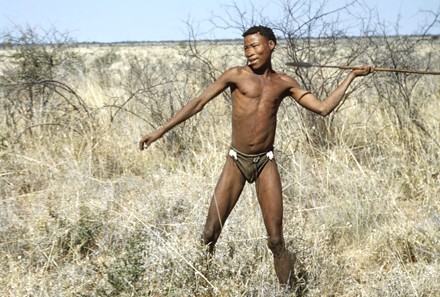John Marshall ‐ The !Kung Project
Bitter Roots
Great Britain, Namibia 2010 | 71 Min. | OmeU

BITTER ROOTS is set in Nyae-Nyae, a region of Namibia located in southern Africa’s Kalahari desert, traditional home of the Ju/‘hoansi. It updates the ethnographic film record begun in the 1950s by John Marshall, whose films documented 50 years of change, and who together with Claire Ritchie, established a grass-roots development foundation, which Adrian Strong (the filmmaker) joined in the late 1980s.
Shot in 2007, two years after Marshall’s death (and including footage from his films), BITTER ROOTS documents the return of Strong and Ritchie to Nyae-Nyae where they observe the erosion of a community-led development process following the imposition of a new agenda led by the WWF, which prioritizes wildlife conservation and tourism over subsistence farming. Communities voice their dissatisfaction with the new Conservancy, which has done little to help people farm and improve their lives.
Through archival footage and discussions with community members, this film sensitively examines the problems (lions, elephants, conservationists) the Ju/‘hoansi are currently facing and challenges the myth that they are culturally unable to farm. The film investigates the perpetuation of this myth by showing how tourists and filmmakers still demand to see how people used to live rather than the way they live now, and how the Ju/‘hoansi cope with such expectations, while steadfastly continuing to farm against all the odds.
The Hunters
Namibia, USA | 57 Min. | OmeU
 THE HUNTERS, an early classic in anthropological film, follows the hunt of a giraffe by four men over a five-day period. The film was shot in 1952-53 on the third … read more
THE HUNTERS, an early classic in anthropological film, follows the hunt of a giraffe by four men over a five-day period. The film was shot in 1952-53 on the third … read more


